Life Expectancy Compared To Average Age Of COVID-19 Fatalities
October 1, 2020 - People in Croatia live for an average of 78 years, and the average age of COVID-19 fatalities is 76 years old
The average age of COVID-19 fatalities or those dying as of consequence of Coronavirus is 76.3 years, according to the latest statistics from the Croatian Institute of Public Health. At the time of writing, a total of 280 Coronavirus-related fatalities have so far been recorded in Croatia.
The average age of COVID-19 fatalities has decreased slightly compared to figures released earlier. At the beginning of May 2020, Croatia's Minister of Health announced that the average age of COVID-19 fatalities was 79.2 years.
Most Coronavirus-related deaths have been recorded in the age group of 80 to 89 years. There have been 81 such deaths since the beginning of the epidemic. In the 70 to 79 age group, 71 people died, in the 90 to 99 age group, 34 people died, and in the 60 to 69 age group, 31 died.
In the age group of 50 to 59 years, 21 deaths occurred, and five deaths were recorded in the age group of 40 to 49 years. There have so far been no Coronavirus-related deaths among those under the age of 40 in Croatia. One person over the age of 100 has died from Coronavirus.
There is currently no accurate data on the average age of COVID-19 fatalities worldwide. The World Health Organization has previously said that of all Coronavirus-related deaths in Europe, more than 80 percent of the deceased had at least one pre-existing chronic disease, such as diabetes, high blood pressure or cardiovascular disease. Extremely serious, life-changing and even fatal cases of Coronavirus have been recorded in the under 40s in other countries.
The figures used in this news item were originally compiled by Index journalists Ilko Ćimić and Davor Tomšić. This news item is a direct translation of their original, which can be found in Index
Neither the author nor Total Croatia News draws any conclusion from this translation, the figures reported, or their comparison.
For the latest travel info, bookmark our main travel info article, which is updated daily.
Read the Croatian Travel Update in your language - now available in 24 languages
Expect Many English Speaking Visitors to Croatia in 2021, says Google
September 25, 2020 - Croatia is the 14th most searched holiday destination in the world for next year. With over 810, 000 searches on Google, the country should expect a big return of English speaking visitors to Croatia in 2021
Aside from the drop in numbers, the country's accessibility and the implementation of epidemiological guidelines, the biggest effect the Coronavirus pandemic had on Croatia's tourist season of 2020 was the change in visitor demographic. The British, Americans, Canadians and Australians largely stayed away. All that looks set to change next year as Google indicates a big return of English speaking visitors to Croatia in 2021.
Over 810, 000 searches have already been made of Croatia as a holiday destination for 2021 on Google, informing that many thousands are already researching or actively planning a trip. Croatia ranked 14th among the most searched for 2021 destinations, trailing slightly behind the likes of Italy, the Maldives, Mexico, Thailand, Spain and Greece.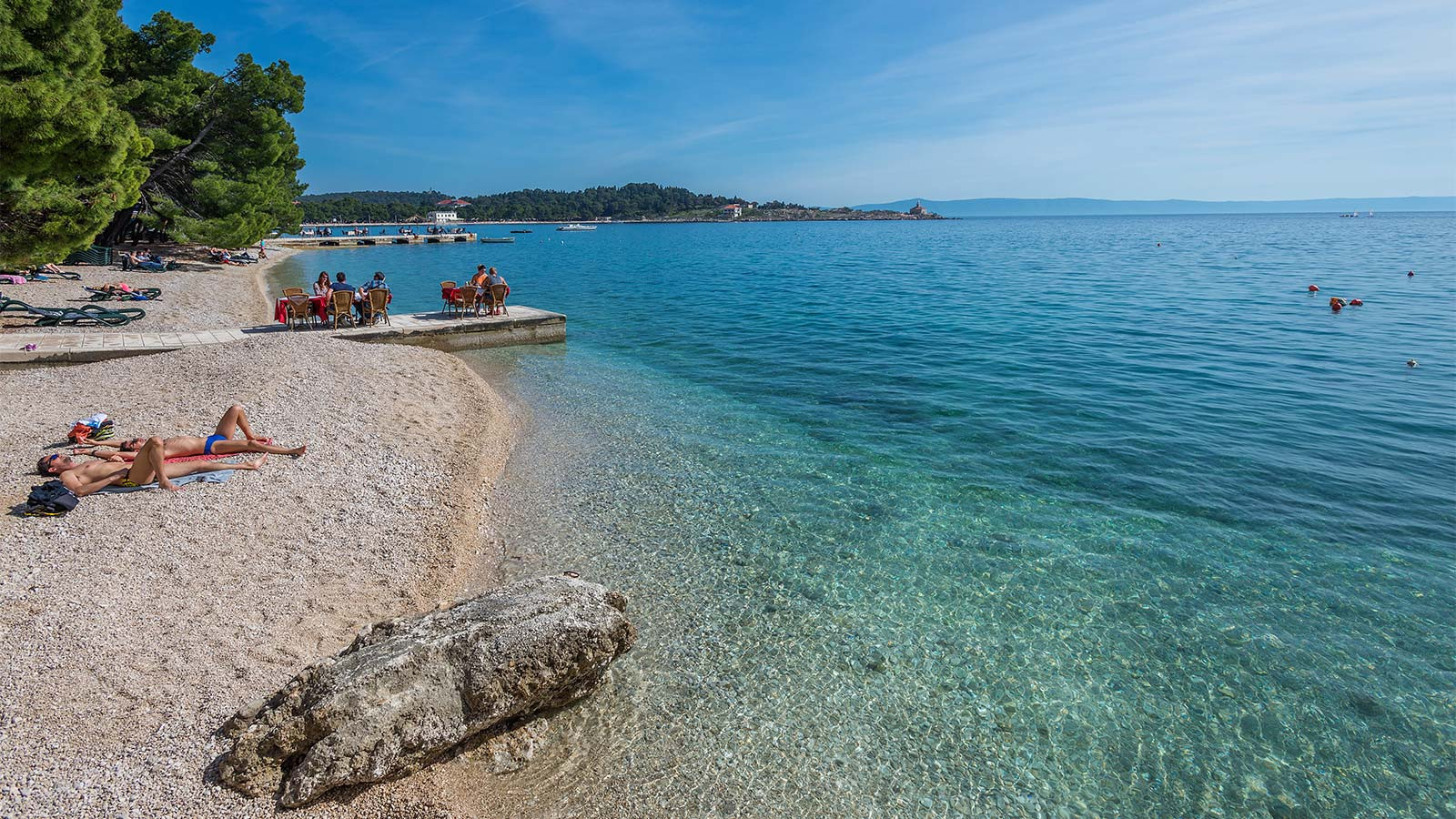 Their language mostly absent from beautiful Adriatic beaches in 2020, English speaking visitors to Croatia in 2021 look set to return © Croatian National Tourist Board
Their language mostly absent from beautiful Adriatic beaches in 2020, English speaking visitors to Croatia in 2021 look set to return © Croatian National Tourist Board
The good news for the return of English speaking visitors to Croatia in 2021 was published by the Electronic System for Travel Authorization (ESTA). The data has been taken from a period starting not before March 2020. This means that all searches took place in full knowledge of the ongoing Coronavirus and epidemiological situation. English speaking visitors are undeterred.
Iva Bahunek, the head of the Croatian Tourist Board in Los Angeles has not had the easiest of tasks since the pandemic began. Her appointment is a relatively recent one. Nevertheless, she has clearly done an excellent job of promoting Croatia as a destination for American tourists in 2021. She confirmed the trends are correct - that US citizens are ready for international travel again - by analysing data from the large American travel insurance company Squaremouth. 65% of all reservations for next year refer to international destinations.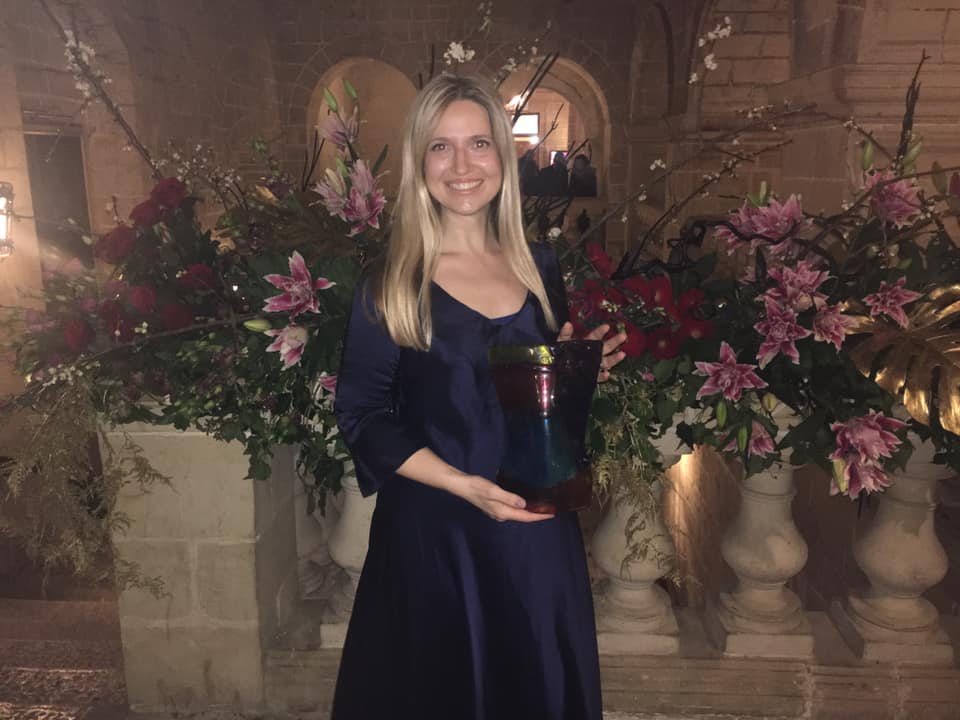 Iva Bahunek accepting her Mediterranean Stars Award for outstanding achievement in promoting Mediterranean tourism, awarded at the 6th Mediterranean Tourism Forum in Malta, 2019. She now heads the Croatian Tourist Board in Los Angeles and analysed data which backs up Google's prediction for a return of English speaking visitors to Croatia in 2021
Iva Bahunek accepting her Mediterranean Stars Award for outstanding achievement in promoting Mediterranean tourism, awarded at the 6th Mediterranean Tourism Forum in Malta, 2019. She now heads the Croatian Tourist Board in Los Angeles and analysed data which backs up Google's prediction for a return of English speaking visitors to Croatia in 2021
Indications from the British market are the same. Total Croatia News recently published an interview with Vedran Meniga, organiser of a music festival site in Sibenik that successfully hosted over 10, 000 festival-goers in summer 2020. Sadly, they were the only ones who braved it. All of the international music festivals that usually take place on the Croatian coast cancelled their 2020 events.
But, some organisers of these festivals have been seen in Croatia over recent weeks, inspecting improvements to the famous The Garden Tisno festival site, which lies at the approach to Murter island. The festival's hugely popular beach stage has had walls removed, its space widened and now looks very well equipped to take on social distancing advice. Music festivals bring tens of thousands of people to Adriatic beaches each summer and the return of the international events will entice English speaking visitors to Croatia in 2021. On the below video you can see Alex Lowes of the Suncebeat Festival and Nick Colgan of The Garden Tisno recently checking out the new layout of the site in preparation for the return of festivals in 2021.
For the latest travel info, bookmark our main travel info article, which is updated daily.
Read the Croatian Travel Update in your language - now available in 24 languages
Over 10, 000 Attend Music Festivals in Sibenik In 2020 - Zero Infections
September 22, 2020 - For six consecutive weeks this summer, the Martinska venue alone welcomed over 10, 000 international visitors to its music festivals in Sibenik. Zero cases of Coronavirus occurred.
Over recent years, three things have firmly placed Croatia on the international stage – Game Of Thrones, the World Cup and music festivals. Running for over a decade now, music festivals are the oldest of these. They have elevated places like Pula and Tisno to become among the most-Googled destinations in the country.
So popular now are Croatia music festivals, that many say the summer season of music festivals in Croatia has supplanted the famous hedonistic holidays of Ibiza as the hippest place to go. Incredible disappointment was therefore felt by tens of thousands of expectant party people earlier this year when most of the international Croatia music festivals decided to cancel their 2020 events. They did so in response to the Coronavirus pandemic.
One venue stood alone – Martinska, a 20-year-old site for music festivals in Sibenik. Over six consecutive weeks, all of their 2020 festivals took place. They did so under strict adherence to epidemiological guidelines. And, following a wait of two weeks after the final event (to cover any potential Coronavirus incubation period), site organisers Pozitivan Ritam have released their results - zero cases of Coronavirus.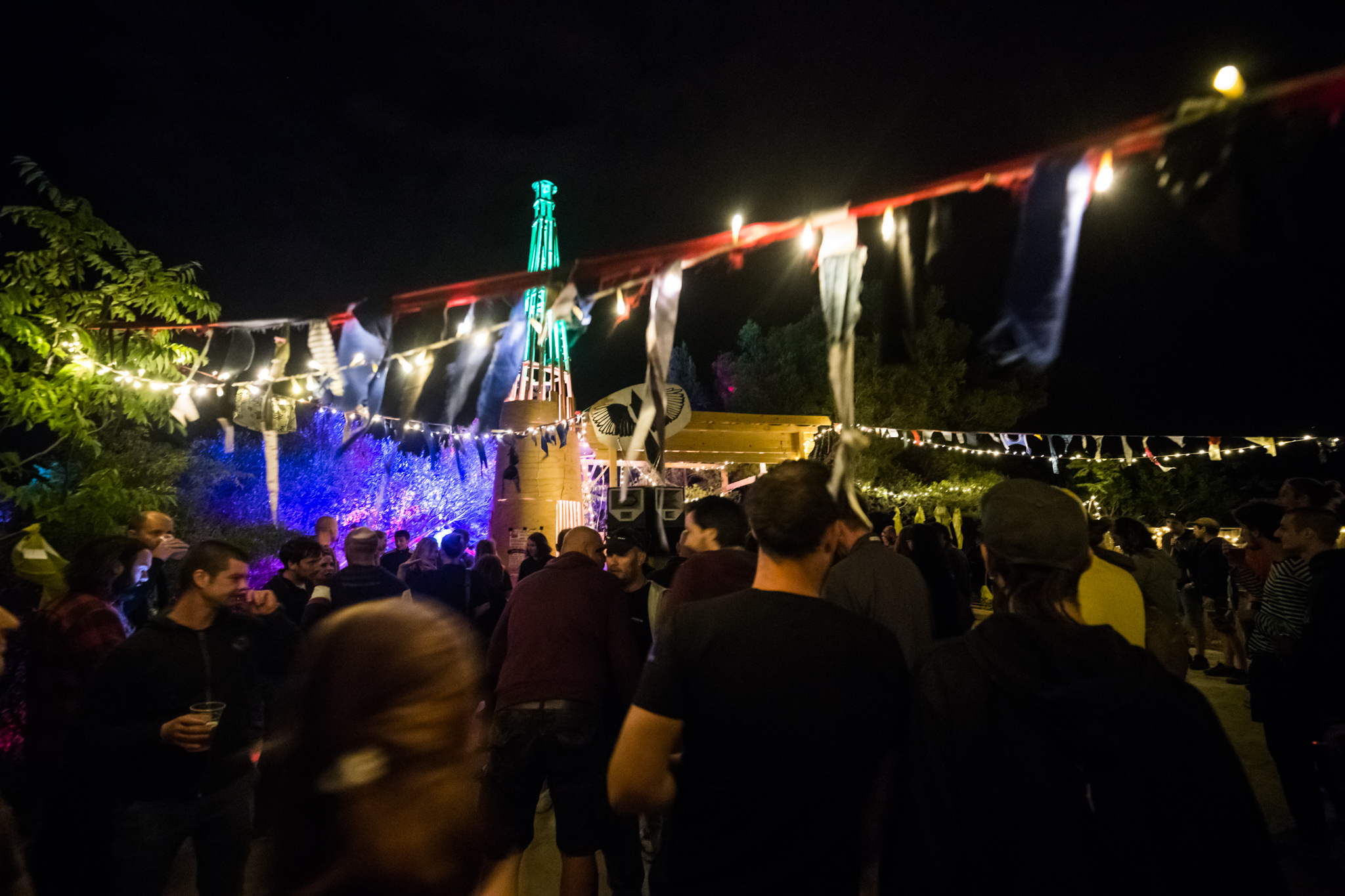
“It's not only the five festivals and one concert event that we did,” Pozitivan Ritam director Vedran Meniga told TCN, “The Fortress of Culture in Sibenik had more than 30 events this summer and Project Vojarna in Sibenik had two parties this year with over 4000 people. On one RTL television show, they described Sibenik as the Croatian Wuhan when 3000 people were in the town for one techno party there. But, at the end of the season, none of these events resulted in a single Coronavirus infection. Not one.”
Following a successful lockdown earlier in the year, cases of Coronavirus were limited in Croatia at the start of the season. Yet, some were understandably hesitant to come. Music festivals in Sibenik still managed to attract visitors from Britain, France, the Netherlands, Belgium and Germany to Martinska. Even after the middle of August when cases began to appear in other regions and international visitor numbers dried up, the festival site was still busy with Croatians and partygoers from near-neighbouring countries. At the end of August, there were no more than five infected persons in Sibenik. None were music festival or music event attendees. Throughout much of the summer, Sibenik recorded zero cases.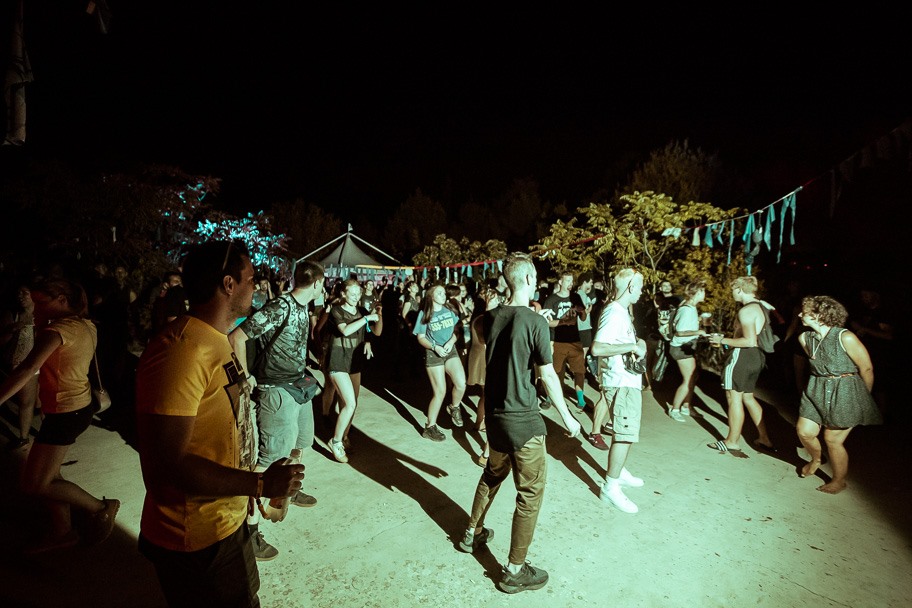
“The music festivals in Sibenik are proof that it's possible to work doing events during the era of Corona,” Meniga tells TCN. “Of course, all of our events were open-air and no doubt that helped.”
"When cases started to reappear elsewhere at the end of July, I went to the civil authorities and epidemiologists immediately, before they came to us,” says Vedran. “The civil authorities and the police grant the license for the events. I presented them with a plan and they were satisfied. They allowed us to continue.”
“It helped that Martinska is across the bay from Sibenik. Festival attendees don't even need to go into the town to come, they drive here straight from the Magistrala (Croatian coastal highway). Also, Martinska's capacity is five times bigger than the numbers we were going to cater for. The site can accommodate six to seven thousand. We expected no more than 1500 daily. That was more than enough space to maintain physical distance. We carefully took all contact details for each attendee at the entrance, in case something appeared and we (or authorities) had to later contact people. We also took everyone's temperature. And in addition to the required epidemiological sanitization, we also installed disinfectant pillars at every single point where money or goods exchanged hands. All our staff wore not only masks but also gloves. Four times the civil authorities made surprise visits to the site for inspection along with epidemiologists and police. Each time they were completely satisfied.”
Current forecasts for the Coronavirus response predict that a vaccine will not be available to cover everyone until the autumn of 2021. This has serious implications for at least one more tourist season. Yet, with the incredible achievements seen this summer at Martinska's music festivals in Sibenik, we can all take hope that events, tourism, and even life itself may continue to be enjoyed in the near future, as long as we're all smart about it.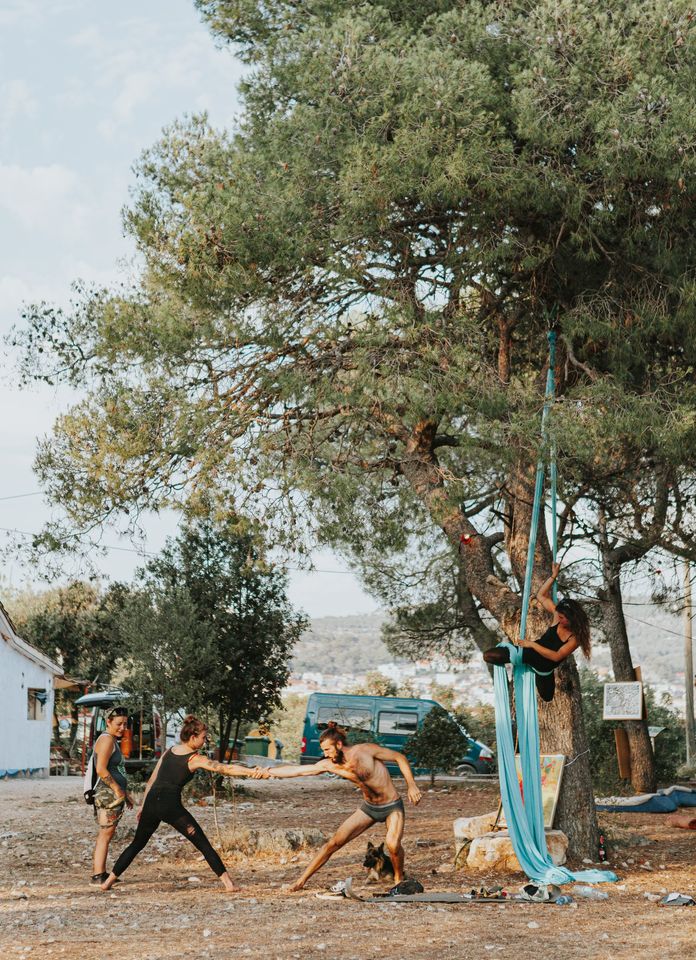
All photos 2020 Martinska © Seasplash / Pozitivan Ritam.
For the latest travel info, bookmark our main travel info article, which is updated daily.
Read the Croatian Travel Update in your language - now available in 24 languages
Luxury Hotel Rooms in Dubrovnik for 50 Euros in October? Let's Go!
Friday 11 September 2020 - As part of the national campaign Tjedan Odmora Vrijedan (Holiday-worthy week) there will be Luxury Hotel Rooms in Dubrovnik for 50 Euros in October. We're signed up! But will others follow?
Luxury Hotel Rooms in Dubrovnik for 50 Euros in October? Idemo (let's go)! In an interview given to dnevnik.hr, assistant mayor of Dubrovnik Jelka Tepšić has confirmed that many businesses in and around Dubrovnik are prepared to sign up to the national Tjedan Odmora Vrijedan (Holiday-worthy week) initiative.
The campaign, conceived by the Croatian Ministry of Tourism, has set aside a week – well, actually just over – in which they are encouraging all within the tourism sector to offer a 50% discount. Covering two weekends, from Friday 16 October to Sunday 25th October, the offer should see some luxury hotel rooms, fabulous meals, and transport carriers offering premium products at half the price. If they sign up.
Luxury hotel rooms in Dubrovnik for 50 Euros in October sounds like a good deal. And it is. During a typical October, visitors are still enjoying the sunny streets of the Old City in Dubrovnik. A luxury hotel at that time would usually cost €200 per night. Because of this year's extraordinary circumstances, those rates are currently €113 per night. Dnevnik.hr, therefore, estimates luxury hotel rooms in Dubrovnik for 50 Euros in October.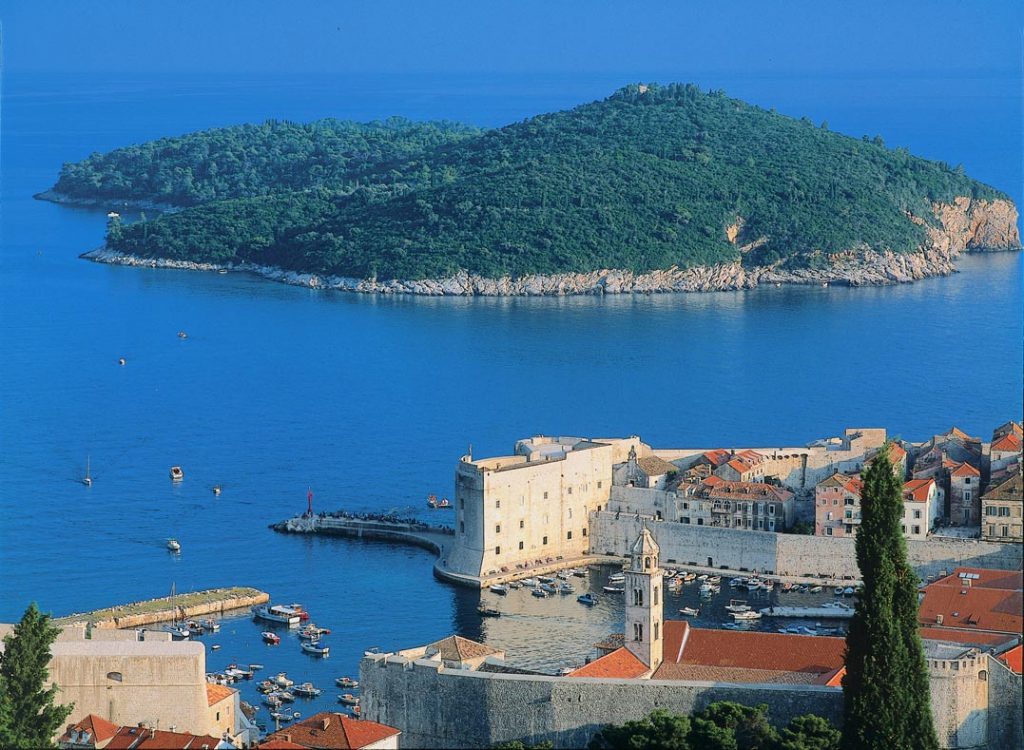
View of the islet Lokrum from Dubrovnik © visitdubrovnik.hr
Dubrovnik is a special case within Croatian tourism. In recent years it has benefitted from its ability to extend its season beyond that which other Croatian destinations can. This is due to its world-famous attributes and excellent marketing. However, being a city linked mostly by charter flights and large cruise ships, it has suffered greater this year than destinations traditionally visited by road users. It's understandable that they would want to optimistically join the initiative.
Some in the tourism sector seem less keen on the initiative. They regard October as too late in the season for such a scheme. Their pessimism may be justified. It has been a much more difficult month to promote for places other than the special case of Dubrovnik – the sea is beginning to see a drop in temperature and in continental regions, the early mornings and evenings in October may necessitate a hoodie and long pants.
But, that's not to say that such destinations couldn't benefit from attracting, in particular, domestic visitors during the initiative week. That is if such homegrown tourists have any holidays remaining. Only time will tell just how widespread the industry will embrace the initiative, and just how beneficial it will be.
For the latest travel info, bookmark our main travel info article, which is updated daily.
Read the Croatian Travel Update in your language - now available in 24 languages
PHOTOS: Pula Amphitheatre and Zagreb Arena Lit Red for Events Industry
September 3, 2020 - Three of Croatia's most internationally famous venues in the events industry were lit in spectacular red on Monday. Pula amphitheatre, Zagreb Arena and Fort Punta Christo were bathed in light from sunset until after dark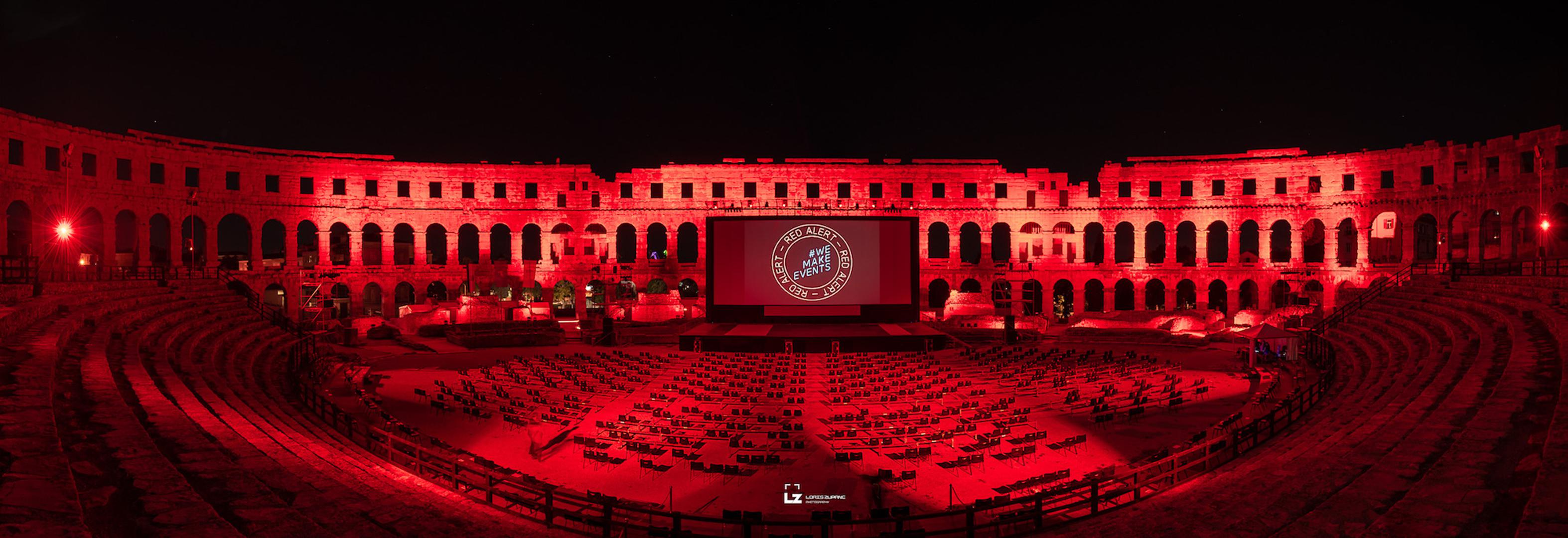
Three of Croatia's most internationally famous venues used by the events industry were lit in spectacular red on Monday. Pula amphitheatre, Zagreb Arena and Fort Punta Christo, also in Pula were bathed in light from sunset until after dark.
Though the change in appearance was enjoyable and visually impressive, the action was undertaken to send a strong message. It was part of a worldwide campaign to highlight the effects of Coronavirus on the events industry and those who work within it.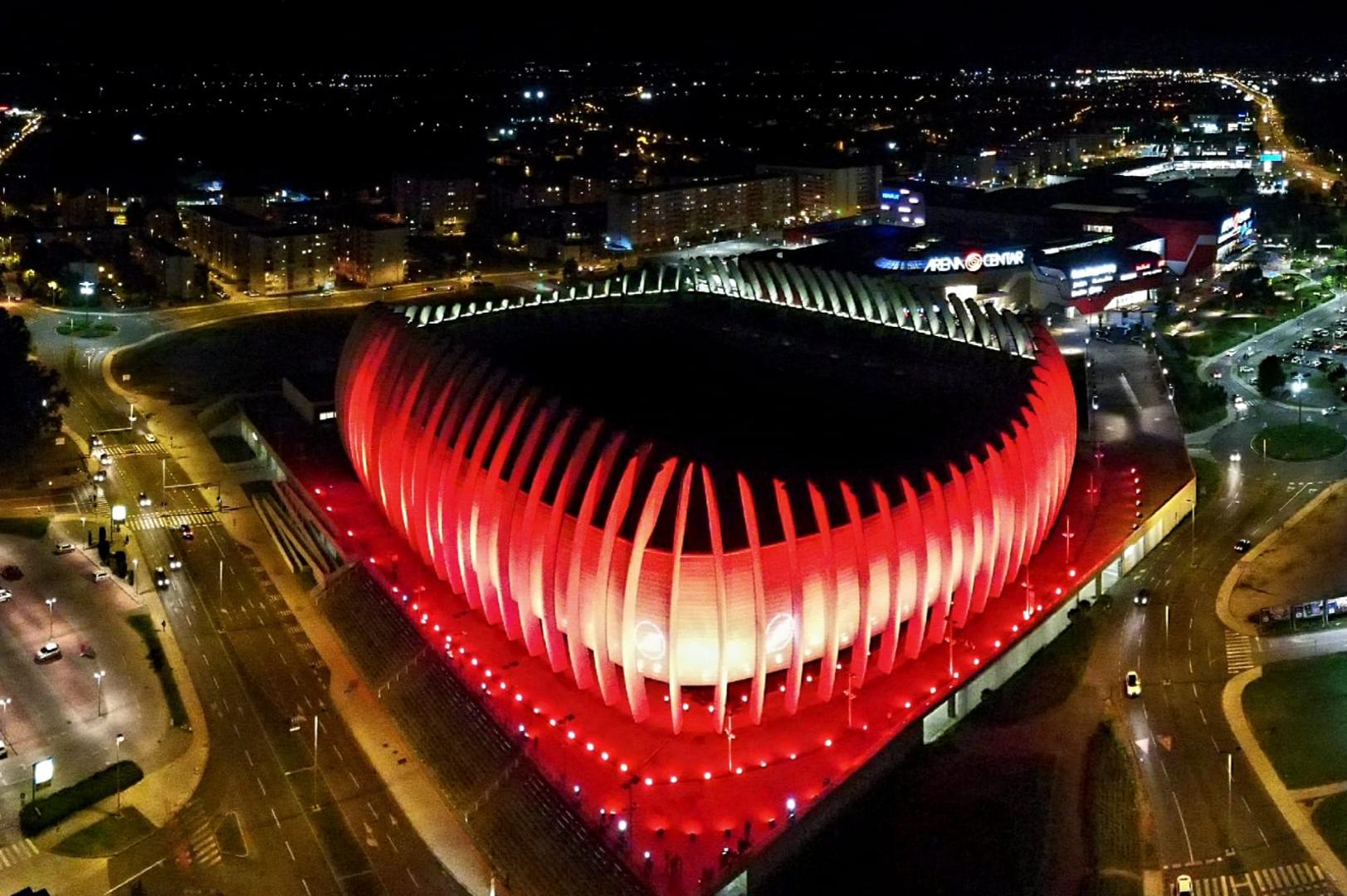
Some of the most famous historical buildings, concert venues and event halls in the world joined the Red Alert campaign and were similarly lit on the same night.
Large public events have been put on hold over most of the world under epidemiological guidelines. Seating arrangements in theatres, conference halls, sports and music halls are simply not compatible with social distancing regulations – many such venues could not make a profit by holding events at 50% capacity.
This has affected millions around the world who work in the events industry, from musicians and performers to technicians, bookers, agents, the media, PR representatives, venue management and general staff. Freelancers operating within the events industry are some of the hardest hit and have had all of their income sources removed completely. Many who operate in the events industry are highly trained and skilled, so diversifying into other industries can be problematic.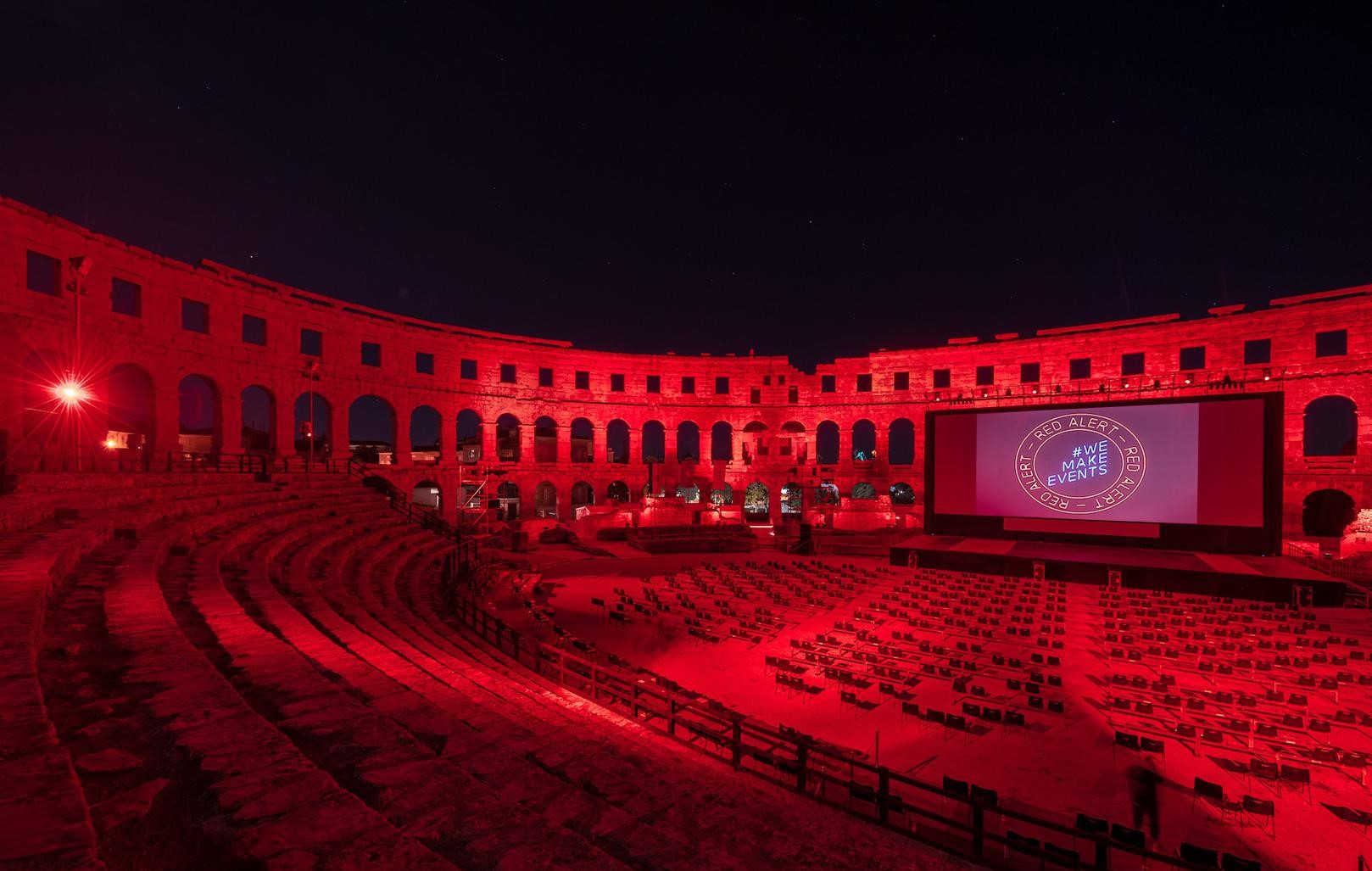
Pula amphitheatre (also known as Pula Arena) is a massively popular open-air venue in warmer months. It holds spectacular opera, ballet and classical music events as well as hosting a film festival. Like Zagreb Arena, it attracts some of the biggest names in pop and rock music. Fort Punta Christo has become famous all over Europe and further over the last decade, thanks to the internationally renowned Outlook and Dimensions festivals. Those events were supposed to take place in Tisno, at The Garden festival site. But, along with seven further festivals due to be held there this year, they chose to cancel in order to safeguard the health of their attendees and locals.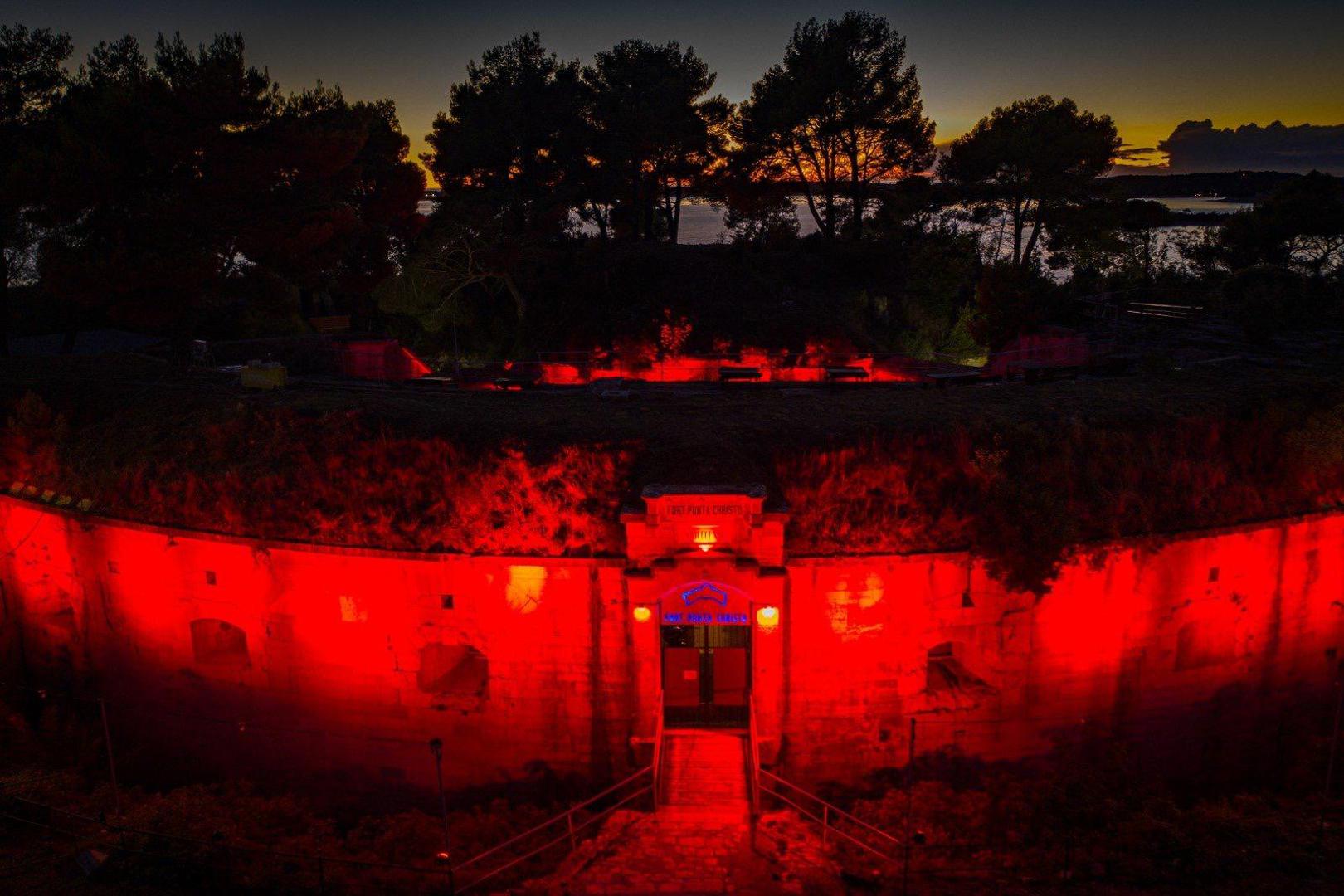
Fort Punta Christo in Pula is widely known as a host site for international music festivals
The Croatian events industry alone is comprised of 2000 business entities, has more than 12,000 employees, and annually generates HRK 4.5 billion. Autumn/winter 2021 is the soonest estimated point at which large scale events could return to normal. The Red Alert campaign has been undertaken to highlight the plight of the events industry as many sections within it face total collapse if deprived of work until then. 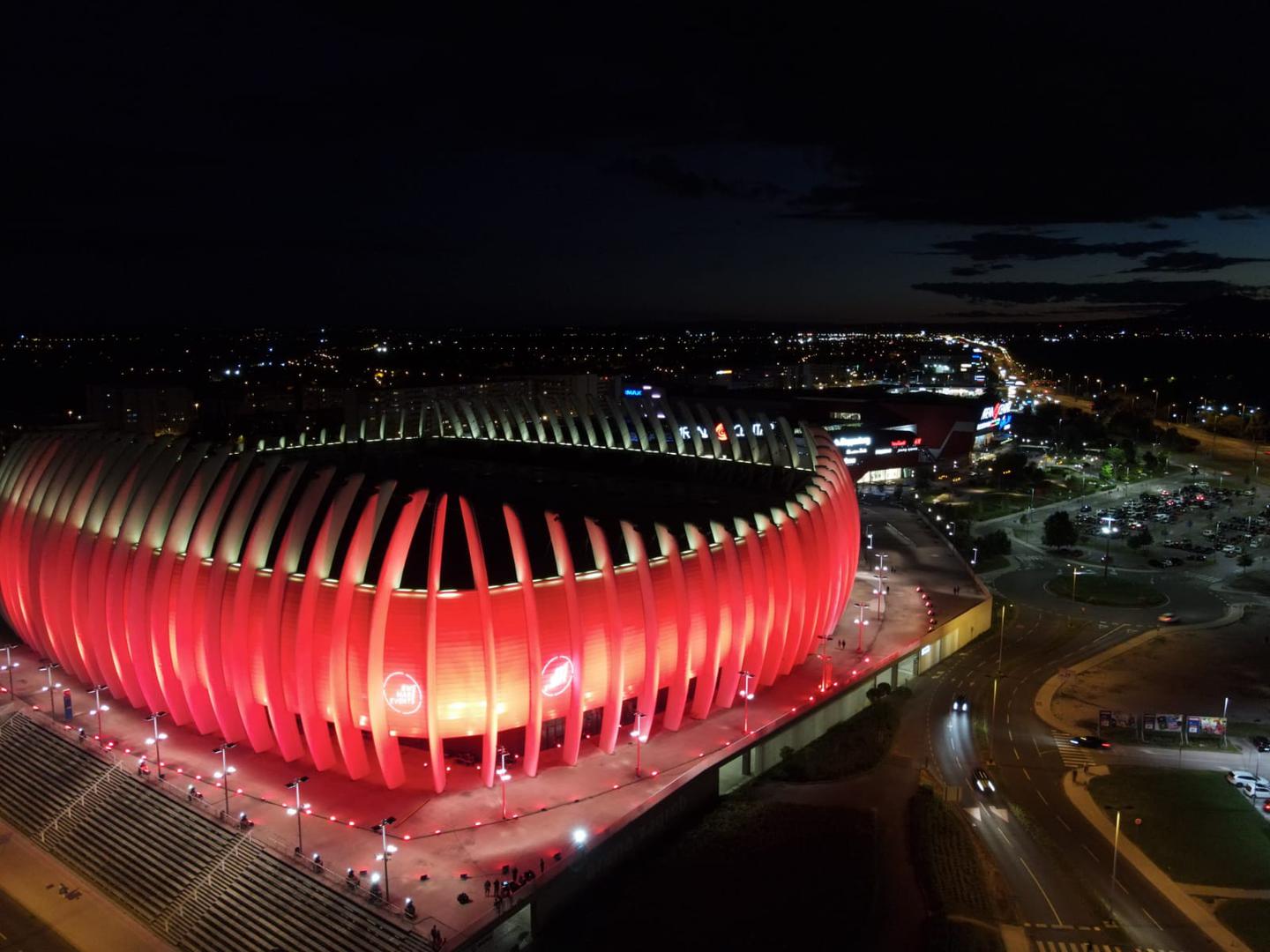
All photos © Red Alert
For the latest travel info, bookmark our main travel info article, which is updated daily.
Read the Croatian Travel Update in your language - now available in 24 languages
What's More Important than Tourism and Coronavirus? Croatian Summer Weddings
September 1, 2020 – Wedding numbers in Dubrovnik-Neretva County have been limited to 50 maximum after a Coronavirus outbreak was traced back to someone's big day. But, who can possibly stop the juggernaut of joy that are Croatian summer weddings?
Epidemiological guidelines can only be followed so far. You can put some extra space between the tables, insist people wear a mask, and aim for the highest standards of hygiene. For all the measures insisted upon by the Croatian state and the sincere efforts of some business owners and their staff, a necessary part of the burden falls on personal responsibility.
People tut and shake their heads in disbelief at the photos and videos of irresponsible Italian youths in the nightclubs of Pag. Others assign blame for Croatia's international safety downgrading on specific regions of Dalmatia and the kind of tourists who visit there. But, there is one homegrown phenomenon which Coronavirus cannot hold back - nor epidemiological measures - and to which no outside blame can be assigned - Croatian summer weddings.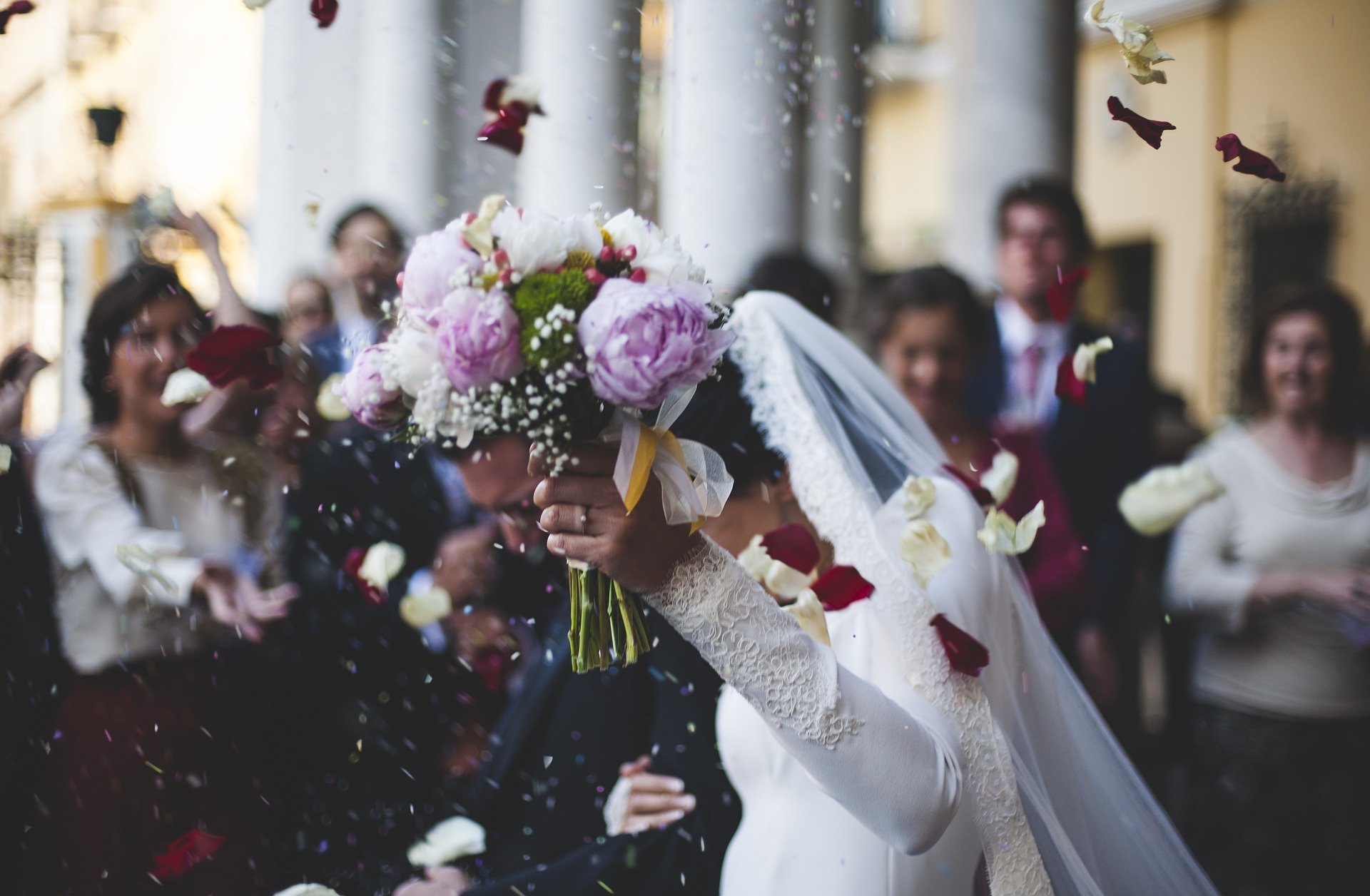
© Pexels
From spring until autumn, the sound of car horns fills Croatian streets each and every weekend. Youths dangle precariously from car windows, the national flag flutters in the air and the strong scent of rakija arrives especially early, even before midday. An occasion of unrestricted joy, of tradition and, usually, extravagant expense, Croatian summer weddings are long in the planning and the fuel for a thousand remembrances. They are automatically dissected after their occurrence, each minute detail compared against the other weddings you have attended.
“They had sarma. In the summertime! And with nothing, only bread. No potato. No rice. Also, there was no fish,” one Dalmatian wedding guest recalled in 2019, after accompanying her husband to a Croatian summer wedding in an agricultural part of the continental region.
“But, surely there was rice in the sarma?”
“Well, yes. But also, the flowers we wore were not as nice as those at my sister's wedding. Her's cost 200 kuna per person!”
Sarma, served in summertime. With no potato! Some details of Croatian summer weddings will never be forgotten © Gurman chef
Everything has to be done correctly. Everyone has to be invited. The seating of guests is given more consideration than the planning of a national counter-attack.
A young couple from Osijek, now residents of Sweden, didn't so much want a traditional affair for their wedding of this year. Both are of an alternative nature. They would have sat miserably through hours of tamburica music. Instead, they wanted similar friends to DJ some music they enjoyed at a more informal gathering, without the compulsion of inviting all the cousins who they only ever see at extended family weddings. A fair request, right? After all, it was their big day, right? Wrong.
Everyone agreed. Except for the bridegroom's sister. She hit the roof “You cannot possibly have a wedding without the tamburica band and all the cousins! We went to ALL their weddings, and gave them gifts! They owe us!”
After ceaseless petitioning to their parents, her demands were eventually met. The parents gave in and refused to pay for the wedding unless it was done correctly. The couple married alone in Sweden, before one witness, who they didn't even know. In Croatia, your big day does not belong just to you. It belongs to everyone in your family.
Nothing can stop this juggernaut of joy. Not poverty nor personal wishes. And certainly not Coronavirus or epidemiological guidelines.
Civil Protection Headquarters in Dubrovnik-Neretva County recently banned 'large' weddings. The maximum number of guests for each wedding is now set at 50. This is in response to an outbreak of Coronavirus in Metković, which stemmed from a wedding held there on 15 August. 38 active cases of Coronavirus were subsequently recorded. And few who've attended a Croatian wedding would be surprised.
Who will try to tell the boys not to drink too much at a wedding, then not to hug or dance with their cousins? Who will tell the godfather of the bride that he must remain distant from his guests, and alone wipe the tears of happiness from his face? This is a day he waited for all of his life.
No wonder, as Slobodna Dalmacija reports in their coverage of the situation in Neretva, that in response to the new limits, Croatian summer weddings are simply now moving across the border into nearby Herzegovina. There, wedding numbers remain unrestricted. No masks will be required to ruin the close group family photos. There probably won't even be anyone stopped on the way back through the border for carrying leftovers. Nor potentially carrying coronavirus.
There is no easy fix to this situation, no simple solution to appease both authorities and celebrating families. We can only hope that the case in Metković is an isolated one and the porous nature of the border with Herzegovina remains the advantage it always has been for Croatians living in the region. For whosoever tries to impede the festivities of Croatian summer weddings is surely fighting a losing cause.
For the latest travel info, bookmark our main travel info article, which is updated daily.
Read the Croatian Travel Update in your language - now available in 24 languages
The Guardian: Dubrovnik Rediscoverd By Locals
August 29, 2020 – Renowned British newspaper compares destinations across Europe and claims, though hit economically, Dubrovnik residents can finally enjoy summer again.
Popular British newspaper The Guardian have today published a feature comparing popular European tourist destinations in the year of Coronavirus. Comparing Magaluf, on the Spanish holiday island of Mallorca, Barcelona on the Spanish mainland and Dubrovnik in Croatia, they tell a story of once packed destinations whose streets this summer are comparatively barren.
The positive side of the story is that this breath of fresh air, though damaging economically, has allowed local residents to rediscover their cities.
“At the moment it’s wonderful,” Dubrovnik tour guide Vesna Celebic is reported to have told the Guardian journalist. “The old town is definitely the place that the locals reclaimed. Now you see a lot of kids riding bikes and playing soccer in some of the public squares, you hear the locals again. You hear the local language.”
However, Celebic's words are not wholly optimistic. In the article, she acknowledges that economic difficulties are looming.
“While I think this is a disaster and economically it’s scary, I think it’s also a moment to pause and reflect,” she said to the newspaper in conclusion. "Tourism should be a pleasure, not only for those coming in but also for those staying in and residing in [the city]."
For the latest travel info, bookmark our main travel info article, which is updated daily.
Read the Croatian Travel Update in your language - now available in 24 languages
Croatia On Slovenia RED List. What Does That Actually Mean?
August 20, 2020 – Slovenians must quarantine if returning from Croatia after the weekend, but what are the implications of Croatia on Slovenia RED list?
Update on August 20, after the official placement of Croatia on Slovenia RED list by the Slovenian government was made public: in order to make things easier for their nationals currently vacationing in Croatia, Slovenia has decided to extend the deadline for the return to Slovenia until Monday. Slovenians who own real-estate and boats in Croatia are given an extra 48 hours, so they can take care of their property before leaving Croatia without self-isolating upon return.
As reported in TCN yesterday, Slovenia has designated Croatia on Slovenia RED list as a country on its red list for travel. Sounds bad. But, what does it actually mean?
Well, for Slovenes, the choice is pretty simple – return home before the end of the weekend, or you'll face a mandatory two-week quarantine and Coronavirus test when you do. The quarantine and test will apply automatically to any Slovene travelling to Croatia after Friday.
But, what are the implications of Croatia on Slovenia RED list?
Well, the mandatory quarantine and test apply to any Croatian entering Slovenia after the weekend. There are exceptions – if you're just passing through, say, on your way to Austria or Germany, the quarantine doesn't apply. You'll have a maximum of 12 hours to travel into, through, and out of Slovenia. The same goes for delivery drivers who are just dropping off or picking up. You can stop for gas and use the WC. Special permits are also available for those who have to cross the border for daily trade.
Not such a big deal for Croats, then? Well, we'll have to wait and see. But, it doesn't look good. The economic implications could bite much harder.
From June, Slovenians have accounted for 7 million overnight stays in Croatia. As reported continuously in TCN's 2020 travel and tourism coverage, regional tourism - lead by those travelling by car – has accounted for the largest number of arrivals this year. Numbers of Slovenes holidaying in Croatia are actually up by as much as 3 percent compared to the same period last year.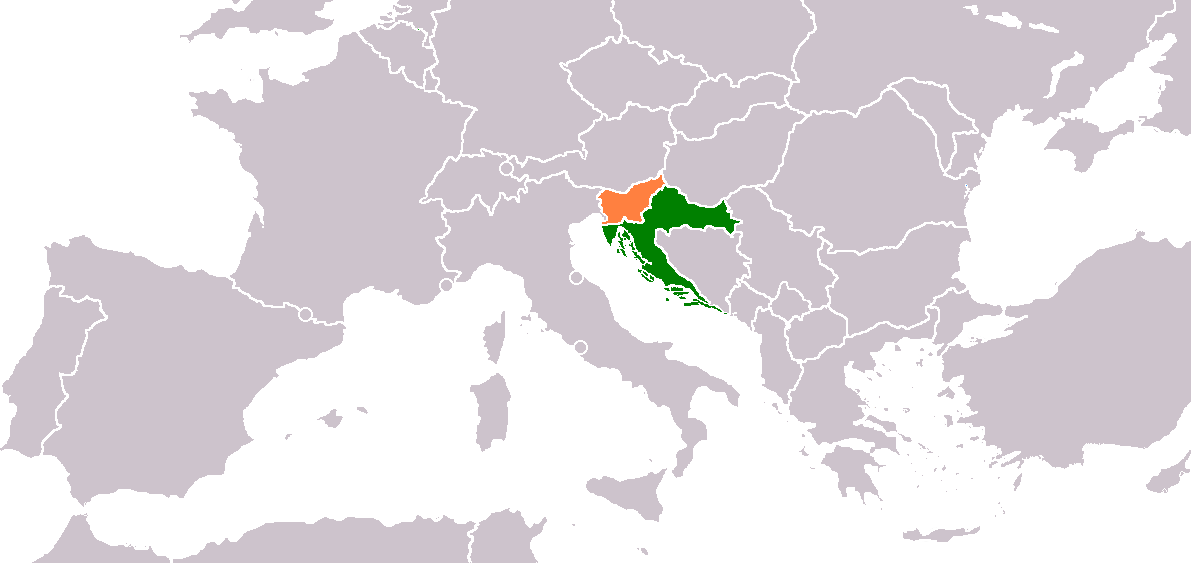
In 2020, visitors from Croatia's next-door neighbour have been more important - and more numerous - than ever before, until Croatia on Slovenia RED list
According to the Croatian National Tourist Board, Slovenes accounted for 8.7% of arrivals and 11.5% of overnight stays in total over 2019, second only to Germans. During this 2020 season, in which their custom is more important than ever, the financial impact on Croatia may be much more damaging than that incurred from similarly imposed classifications by Austria and Italy, who recently announced mandatory testing for all returnees.
The peak days of the season are already behind us but, truth be told, the season only began in earnest a month ago. There was no pre-season this year. Hopes of an extended season, based on the optimistic numbers of July / early August, now seem to be dashed, due to the rise in number of COVID-19 infections. Certainly from the Slovenian market.
Will Slovenes and others accept a mandatory quarantine in exchange for their annual break on the Croatian coast? Some may. Surely, some won't. Any Slovenes planning trips in late August or September have been given serious cause to reconsider, thanks to the new classification. School and work start again in September – how does a two-week mandatory quarantine fit into that schedule?
Nobody really knows how long the 'red card' Slovenia has given Croatia will last, nor when it will end. The answer presumably lies in Croatia's ability to address its number of newly infected. Before all criticism for the stranglehold this classification places on the 2020 season is attributed to Slovenia, Croatia must first ask itself some tough questions; could Croatia – from staff and owners in the service industry, right the way up to state level - have done more to keep the numbers down? For it is the numbers now that can help save the remainder of Croatia's 2020 tourist season, not the Slovenes.
For the latest travel info, bookmark our main travel info article, which is updated daily.
Read the Croatian Travel Update in your language - now available in 24 languages
After Floods, Earthquake, COVID-19, The City Is Not Broken: This Is Zagreb!
July 27, 2020 – OPINION: Marc Rowlands downplays the doom and gloom, claiming it will take even more than 2020's disasters to permanently damage Zagreb
International readers must think the city has fallen. After the triple hit of COVID-19, the strongest earthquake in a century, and last weekend's floods, they must imagine the people of Zagreb to be largely underwater, the tips of their toes resting on rubble, struggling to breathe above the waves through their surgical masks.
Their suspicions would only be justified if they're reading the comments sections of the coverage. “Oh, whatever next?”, “What will become of us?”, “May God save us!”, “First an earthquake, now snow! It's the end of the world!”, “It's because of global warming, I told you years ago. Now, not even my bitterness can save us”. Jadni smo (poor us).
That's because there are two types of people in this world; the doom-mongers - useless pessimists who sigh, tut, and briefly sympathise while reading the news, and then there are the positive thinkers who actually get up off their ass and help out. Sadly, the internet is full of the former. Thankfully, Zagreb is full of the latter.
Take for example Mirna Mrčela, who rescued a man from a sinking car on Friday night. Did she stop to worry about the implications for her or for the sunken city before diving into waters on Miramarska street to save him? She did not.
What about the young Zagreb residents who gave up their free time to help rebuild people's homes following this year's earthquakes? Or those who volunteered to help move children from the damaged wards of a hospital? What about the thousands of Croats who thought of innovative or compassionate schemes to raise money for those affected? Or the many more who donated? Or those who used their own drones to help assess damage to buildings? Was their assistance delayed by worry and self-pity? No.
Thousands of young people have been gathering outside the Croatian National Theatre at weekends. The real picture in Zagreb © Marc Rowlands
Even aside those who actually helped out, the story of Zagreb in the wake of both the earthquake and the floods has been one of irrepressible resilience, optimism, and joy. Thousands of young people have gathered outside the Croatian National Theatre at weekends simply enjoying to be, and each other. In recent weeks, Ribnjak Park, Zrinjevac Park, and Strossmayer Promenade in the city have come alive with gastronomic events, music, and people enjoying themselves.
On Monday 27 July, as the sun shines brightly above Zagreb, the last remnants of the flood are all but gone. People are at work, as usual, and some tourists can be seen taking tours around Tkalčićeva and the cathedral. No matter what news story comment sections might tell you, this city is open for business. Zagreb has seen much worse than this. And it will take a lot more than rain, earthquakes or, yes, even snow to dampen its spirits.
Changes to the Rules for Entering Croatia: EU Citizens Welcome, Others Need Test or Self-Isolation
July 11, 2020 - In a somewhat unexpected turn of events, the Croatian Public Health Institute published yesterday evening the new set of recommendations and instructions for passengers trying to cross the Croatian national borders.
Croatian Police Publish New Official Border Guidelines, Effective July 11, 2020
You can find the document in Croatian here (link to the .pdf document), and read the article to see what it says:
- Nothing changes for the EU, Schengen area and associated countries passport holders, their families and the third-country citizens that have permanent residence in the EU.
- Third-country nationals are not allowed to enter Croatia, except for: health workers, people working across the border, people working in transport of goods, diplomats and other staff, passengers in transit, people coming to Croatia for tourism, other business reasons or educational purposes and people who come to Croatia for other immediate reasons (including owning property in Croatia).
Passengers in transit need to leave Croatia within 12 hours, and then do not need to self-isolate.
Passengers arriving to Croatia for immediate personal reasons are now obliged to go into self-isolation for 14 days after entering Croatia. The self-isolation can be reduced to 7 days, if the person undergoes PCR testing (they have to pay for it) and shows a negative test a week after they've entered Croatia.
Passengers arriving in Croatia for tourism, other business or education are allowed to enter Croatia, but either need to show a negative PCR test, not older than 48 hours, or need to self-isolate for 14 days. Even if they're not given the formal measure of self-isolation, they shall comply with the following measures during the first two weeks of their stay in Croatia:
they should exit from their accommodation only when necessary, for business purposes if that was the reason for their entry into Croatia, and they shall implement intensified hygiene measures.
The document does not state clearly when these changes will come into effect, but our understanding is that the new regime started at midnight last night, so it's already in force. PLEASE NOTE this is not 100% confirmed. We are seeking clarification.
UPDATE: We received some additional information from MUP in answer to some of our questions. The new restrictions do not apply to EU/EEA/UK. The EU safe list of 15 is NOT included in the exemption (ie they need test/isolation). Tourist arrivals are an exception, so they're allowed to enter Croatia. If the tourists have proof of a negative PCR test not older than 48 hours, they're not put in self-isolation, but it is recommended they do not leave their accommodation and should limit their contacts to the necessary ones. There are no changes to the recommendations regarding the funerals. Regarding weddings, only parents, siblings, and best man/maid of honor are allowed, but they should also have proof of a negative PCR test.
Hospital treatments for third-country nationals are allowed only if urgent and already planned (we will ask for more clarification on this) and with a negative test.
For the latest travel info, bookmark our main travel info article, which is updated daily.
Read the Croatian Travel Update in your language - now available in 24 languages


